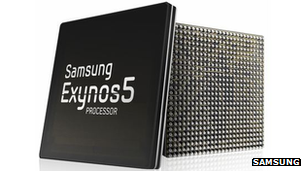Samsung denies Galaxy S4 is designed to trick tests
- Published

Samsung denies its flagship handset was designed to give misleading speed test results
Samsung has denied claims it deliberately designed its Galaxy S4 chip to perform better in tests used by reviewers than in real-life situations.
It issued a statement after researchers showed the handset achieved a higher graphics processing clock speed when benchmarked by specialist software than when it ran advanced games.
The company acknowledged the two situations created different scores.
But Samsung said its aim had been to prevent users experiencing a fault.
The tests involved the Samsung-designed Exynos 5 Octa chip used in South Korean and other international versions of the handset.
It is not featured in the US or UK editions, which use an alternative chip made by Qualcomm.
Overload protection
The issue was first raised by a contributor to the Beyond3D forum, external on Saturday.
"Oh hell Samsung, shame on you!" wrote the Luxembourg-based member, nicknamed Nebuchadnezzar.
"This GPU does not run 532MHz; that frequency level is solely reserved for Antutu and GLBenchmark among things."
The reference to the chip's graphics processing unit suggests it was operating 11% faster when running Android and 3D graphics testing programs than it would otherwise achieve.
The claim was then followed up by Anandtech, external, a review site famed for the detail of its computer chip tests.
Two of its researchers replicated the finding and confirmed the higher frequency only became available when carrying out specific benchmarks.
They pointed out that the discovery had only been made because Samsung made it relatively easy to monitor its mobile chip's GPU clock.
"This seems to be purely an optimisation to... deliver the highest possible GPU performance benchmarks," they wrote.
"We've said for years now that the mobile revolution has/will mirror the PC industry, and thus it's no surprise to see optimisations like this employed.
"Just because we've seen things like this happen in the past, however, doesn't mean they should happen now."
But Samsung has strongly denied the claim.
"Under ordinary conditions, the Galaxy S4 has been designed to allow a maximum GPU frequency of 533MHz," it said.
"However, the maximum GPU frequency is lowered to 480MHz for certain gaming apps that may cause an overload, when they are used for a prolonged period of time in full-screen mode," it said.
"Meanwhile, a maximum GPU frequency of 533MHz is applicable for running apps that are usually used in full-screen mode, such as the S Browser, Gallery, Camera, Video Player and certain benchmarking apps, which also demand substantial performance.

The Exynos 5 Octa uses GPU technology licensed from British firm ARM
"The maximum GPU frequencies for the Galaxy S4 have been varied to provide optimal user experience for our customers, and were not intended to improve certain benchmark results."
Public indifference?
The allegations have been repeated among much of the tech press, with some publications going so far as to say Samsung had "cheated", "fudged", "rigged" and "cooked" its results.
However, one analyst suggested that in truth such benchmarks and any controversy linked to them was unlikely to have any influence on sales.
"Most consumers look for a smartphone with a great camera, user interface and the apps that they want to use regularly," said Windsor Holden, a mobile industry expert at the consultants Juniper research.
"The criteria the public uses for handset purchase aren't necessarily those which might attract criticism and opprobrium in the technical press."
- Published15 March 2013
- Published23 July 2013
- Published26 July 2013